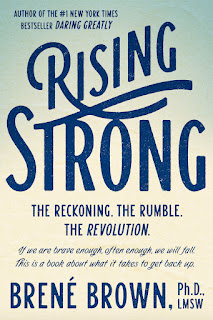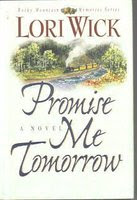Author: Dr. Brene' Brown
Info: Copyright 2015: New York: Random House Audio
Where acquired: Audio library check out.
Rating (on a scale of 1-4 stars): ✮✭✭ 1/2
What it's about: In what I would call The Gifts of Imperfection: Part 3, Dr. Brown dissects the negative effects of vulnerability, how to rise from the pain of being genuine and continue to emotionally mature through the process.
Favorite Quotes:
From the introduction: "There are too many people today, who instead of feeling hurt, are acting out their hurt. Instead of acknowledging pain, they're inflicting pain on others. Rather than risking feeling disappointed, they're choosing to live disappointed."
From Chapter 1: "The problem is; when we stop caring about what people think and stop feeling hurt by cruelty, we lose our ability to connect. But, when we're defined by what people think, we lose the courage to be vulnerable. Therefore, we need to be selective about the feedback we let into our lives. For me, if you're not in the arena getting your ass kicked, I'm not interested in your feedback."
From Chapter 6: "What is the point? I can't eat anything that will make me feel better. What I really want is chicken fried steak and mashed potatoes. I need to drown my resentment and anger in cream gravy....But I knew cream gravy was only a short term fix and would break my tenuous commitment to not numb with food." I feel your pain, sister.
From Chapter 9: "The difference between shame and guilt lies in the way we talk to ourselves. Shame is a focus on self, while guilt is a focus on behavior." "It's always helpful to remember that when perfectionism is driving, shame is riding shotgun."
Also from Chapter 9: Her stories of "Hairy Toes" and "Sexy Rice"
What I Liked:
- I appreciate her honesty about our propensity to "gold plate grit"--to acknowledge a failure or struggle, but failing to deal with the emotions surrounding the disappointment of unmet expectations. In other words, the "before and after" syndrome that doesn't explore the messy middle.
- Dr. Brown was the narrator of her own audio book. She's an academic from Texas, so her storytelling sounds like someone from my neck of the woods, instead of some snob trying to impress by talking over my head..
- The genuineness of the author using stories from her own life were a welcome addition to the text. However...
- Some of her stories left me scratching my head. For example, in chapter 2 (without spoiling it) Dr. Brown describes an argument / vulnerable moment she had with her husband. Quite frankly, I didn't get it. I realize that I don't understand the marriage dynamic, but I know manipulation and extreme emotional pressure when I see it. It goes back to the whole, "If mama ain't happy, ain't nobody happy" crock of bull. The story didn't show me a story of rising strong, but of pouting to get what you want--even if you don't know what it is.
- I was very angered by her diatribe on privilege, more accurately "white privilege." When she started that line of bull, I rolled my eyes and practically screamed out loud (as if Dr. Brown could hear my ranting and raving on the Ladiga Trail all the way from Houston, Texas) "D--n it, Brene'! You didn't get where you are because you are white. You succeeded because you worked your a-- off and did what it took to get where you are. You aren't prosperous because you disenfranchised other races of humans and forced them into poverty so you could have more. You did the work. Be proud of who you are. And for the LOVE, stop being ashamed of being white!"
- Like all of her books I read, there's cussing in it. I can't really complain since she brought out the cuss in me this time.
- I didn't understand her contrast of broken heartedness versus disappointment. Doesn't one feed the other?
Quite honestly, after my first reading of Rising Strong, I absolutely hated it. I was ready to give it one of these...
...and move on. However, I knew there was something deeper here. I had discussions with my mentor and with my sister-in-blog, Annie (Yes it took both of them to talk me down from the ledge of dumping the book and saying "screw it"). What I gathered from their insights was that I was ready to dump the book because it brought out vulnerabilities that I didn't really want to deal with. So, what did I do? Instead of dumping the book, I reread it two more times, plus, reading portions between other readings in a frantic attempt to get to the root of what I needed to learn. I needed to learn to acknowledge and work through the pain of my own vulnerabilities. Most importantly, I needed to learn that I could give myself permission to feel what I feel and deal with it. But boy, the issues this book brought out were agonizing.
It's no secret (or maybe it is) that I struggle with race, gender, and socioeconomic status. I'm a black woman who refuses to use those as excuses for where I am (or am not). I firmly believe that "privilege" --or the lack thereof--has nothing to do with my station. I have my own personal demons to deal with; I don't have time to create haints that aren't there. I'm a woman who struggles with being unmarried, childless, and over 40 in the midst of Western and Judeo-Christian culture that dictates that the foundation of womanhood is built on marriage and family. I'm on the low rung of the socioeconomic ladder, and I struggle with simple things others scoff at such as trying to eat healthy on a tight budget, getting out of debt, and trying to get a decent car before my old one gives up the ghost. So, my definition of rising strong isn't going to look like what people think it should look like. Reminds me of a quote from Craig Ferguson, "I don't want to be one of them; I want to be one of ME."
















